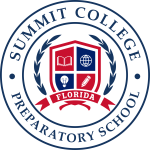Academic Entry Requirements
Admissions based on readiness, language strength, and global academic fit.
U.S. Eastern Time (Florida) · Last updated: August 2025
See also: Admissions · How to Apply
Admissions Are Based on Readiness
Summit admits students who can grow in a structured, college-preparatory environment. We evaluate commitment, academic maturity, and purpose; consequently, readiness matters more than automatic promotion.
Main Concept
Summit is not open enrollment. We place by demonstrated skill in academics, language, and critical thinking, not by age or prior labels. Students typically enter in Grade 9. Grade 10 admission is rare and requires clear readiness for advanced work and on-time graduation. We do not accept new students into Grades 11 or 12 because the program relies on long-term curriculum planning and sustained mentorship.
Accepted Entry Levels
Grade 9 Entry
Applicants complete Grade 8 (or equivalent) and begin in Algebra I or higher. They communicate fluently in academic English and actively study two additional world languages. They write clearly, reason with evidence, and sustain a six-day academic rhythm. We also consider maturity, motivation, and comfort with individualized instruction. For procedure, see How to Apply.
Grade 10 Entry
Admission at Grade 10 is selective. Candidates show strong Grade 9 performance, eligibility for honors-level courses, and the capacity to maintain an accelerated pace while meeting all graduation requirements on time. Start with the initial documentation step in How to Apply.
Grades 11–12
We do not enroll new students into Grades 11 or 12. The program’s sequenced coursework, language progression, and portfolio development require earlier entry.
Language Requirements
Students demonstrate fluency in academic English at an advanced level and maintain progress in two additional world languages. Applicants may include recent writing samples, oral recordings, or study logs to document readiness. Consequently, placement reflects demonstrated skill rather than prior labels alone.
Placement Upon Admission
We confirm placement through mathematics and language diagnostics, a transcript and portfolio review, and creation of an Individual Learning Plan. Counselors align graduation requirements and course sequencing; therefore, the four-year map is clear before classes begin. See the steps in How to Apply.
Transcript, GPA, and Grading
Summit issues an official transcript listing courses by term with credits and final grades. The record prints the grading scale, GPA method, and any weighting policy; therefore, colleges can read performance without interpretation. We also retain rubric histories and portfolio samples to substantiate reported outcomes.
We report an unweighted 4.0 GPA. When a course carries an Honors or Advanced designation, the transcript also shows the weighted GPA as printed on the record. If a receiving institution requests rank, we provide the policy in effect at graduation or an approved alternative such as GPA distribution.
Course Levels and Weighting
College Preparatory courses deliver university-entry rigor with documented outcomes and graded portfolio evidence. Moreover, Honors courses move faster, assign deeper readings, and require higher-order analysis. Advanced courses reach university-entrance rigor comparable to leading international frameworks and include sustained research or Advanced-style projects. Any weighting used appears directly on the transcript and in the course catalog.
Credit, Contact Time, and Documentation
One Summit credit corresponds to a full academic year of study with live instruction, labs or seminars as appropriate, and directed independent work. We log live minutes, assignments, and assessments in Microsoft 365; consequently, credit rests on verifiable contact and demonstrated mastery. As guidance, a 1.0-credit course meets or exceeds approximately 120 Carnegie hours in aggregate; a 0.5-credit course meets or exceeds approximately 60 hours.
Assessment Integrity and Proctoring
Teachers proctor major assessments live on Zoom Pro with camera on and, when appropriate, screen share and periodic room scans. When the task warrants, students complete an oral defense to confirm authorship and understanding. Additionally, we store annotated rubrics and version history; as a result, the portfolio shows method, correction, and mastery — not only a final score.
Counselor Verification and School Codes
Counselor of record: admin@summithighschool.org · +1 (727) 339-7339. Official transcripts carry a digital signature and counselor verification. Colleges may request confirmation by email or phone. Furthermore, the school operates in U.S. Eastern Time (Florida), and the master calendar observes EST/EDT.
Records, Privacy, and Retention
We store academic records in Microsoft 365 with role-based access and no public links. Classes are recorded only when instruction requires it and after notice; files then reside in OneDrive with limited access and scheduled deletion. Additionally, we retain transcripts and essential academic records according to policy and disclose information consistent with FERPA and applicable law.
International Records and Language Evidence
For international applicants, we accept certified translations of transcripts and official records. We also review language evidence such as CEFR writing and speaking samples or HSK documentation for Mandarin and, when needed, calibrate placement with live diagnostics. Consequently, the entry level reflects demonstrated skill rather than prior labels.
Calendar, Time Zone, and Communication Standard
We schedule all classes and deadlines in U.S. Eastern Time (Florida). We confirm changes in writing, update calendar invites immediately, and reply to family inquiries within one business day. Therefore, families always know the current schedule, expectations, and next steps. See the Academic Calendar.
Next steps: How to Apply • Admissions • Registrar & Records • Academic Calendar • Course Catalog • School Profile • U.S. Dept. of Education – FERPA
Next Steps
Ready to proceed? Begin with the initial documentation step or review the full process.
Submit Initial Documentation · How to Apply · Admissions Overview
